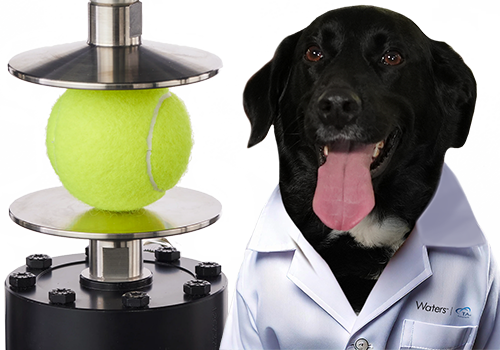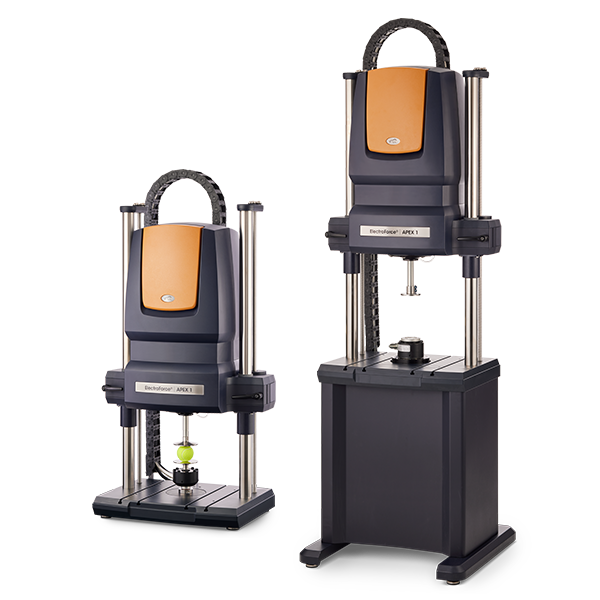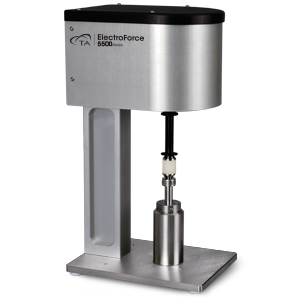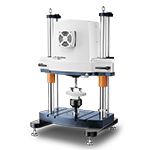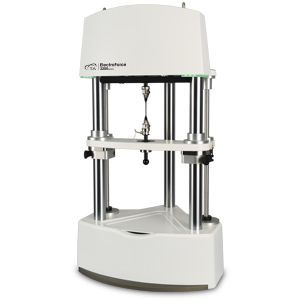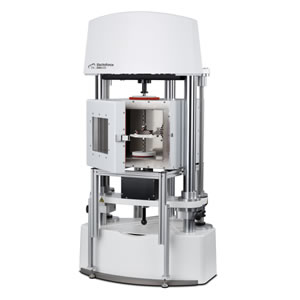View Load Frames Brochure ElectroForce Accessories Request a Quote
Mechanical tests performed using load frames reveal important stiffness, strength, and durability characteristics of test samples, often pushing samples to failure to determine yield strength, ultimate strength and fatigue life. Test samples range from materials to subcomponents to complete components/products. Loading is applied by linear motors with a variety of loading profiles. These profiles can be a single push- or pull-to-failure such as a classic ‘tensile test’, repetitive loading for fatigue, or creep/stress-relaxation measurements. Environmental effects can be evaluated by testing in temperature-controlled air, gas, or fluid submersion. Occasionally, more complex modes such as axial-torsion loading are used to characterize samples in various combined states of stress and strain.
A load frame instrument offers a flexible, open and large test space to accommodate a range of sample sizes. It leverages a linear motor as its primary loading mechanism, and force and displacement sensors for measuring the sample’s mechanical response. These are integrated to a test controller and software user interface which allows users to program a variety of tests, ranging from a simple ramp-to-failure, fatigue sine waves, and complex real-world simulation profiles. Accessories can be added to evaluate specimens in various environments, using a variety of sensors and sample gripping techniques.
The ElectroForce Load Frame series features electrodynamic linear motors, combining rare-earth magnets and specifically designed electromagnetic topologies that are optimized for material testing and deliver best-in-class displacements and force over a wide range of frequencies. Operating without contact bearings, these motors provide friction-free linear guidance that delivers the ultimate reliability backed by a 10-year motor warranty and precise control that is only possible with a no-friction motor design. The ElectroForce family of load frame instruments offer a range of force capacities (200 N to 15,000 N) and accessories to best match the needs of the test. As the platform for our High Force DMA products, ElectroForce load frames offer even more versatility for viscoelastic material or component characterization. The advanced WinTest control software paired with the TRIOS data plotting, analysis and reporting software deliver an easy and reliable experience regardless of whether your test is less than 1 second or over 6-months long.
Common Testing Standards
- ISO 527 – Plastics — Determination of tensile properties
- ISO 1099 – Metallic materials — Fatigue testing — Axial force-controlled method
- ISO 6475 – Implants for Surgery: Metallic Bone Screws
- ISO 6892 – Metallic materials — Tensile testing
- ISO 7206 – Implants for surgery — Partial and total hip joint prostheses – Endurance Properties
- ISO 14607 – Non-active surgical implants — Mammary implants — Particular requirements
- ISO 14801 – Dentistry — Implants — Dynamic loading test for endosseous dental implants
- ISO 14879 – Determination of endurance properties of knee tibial trays
- ASTM D623 – Test Methods for Rubber Property—Heat Generation and Flexing Fatigue In Compression
- ASTM D638 – Test Method for Tensile Properties of Plastics
- ASTM D1614 – Shock Attenuating Properties of Materials Systems for Athletic Footwear
- ASTM D3039 – Tensile Properties of Polymer Matrix Composite Materials
- ASTM D3479 – Test Method for Tension-Tension Fatigue of Polymer Matrix Composite Materials
- ASTM D4482 – Test Method for Rubber Property—Extension Cycling Fatigue
- ASTM E8 – Test Methods for Tension Testing of Metallic Materials
- ASTM E466 – Conducting Force Controlled Constant Amplitude Axial Fatigue Tests of Metallic Materials
- ASTM F543 – Standard Specification and Test Methods for Metallic Medical Bone Screws
- ASTM F1717 – Test Methods For Spinal Implant Constructs in a Vertebrectomy Model
- ASTM F2077 – Test Methods For Intervertebral Body Fusion Devices
ElectroForce Load Frame Instruments
Application Notes
- Automotive Fatigue Life and Dynamic Mechanical Analysis of a Matrix Polymer
- Flexural Fatigue Behavior of Woven Fiberglass Composites at Elevated Temperature
- Sustainable Tire Rubber – A Comparison of Silica and Carbon Black Filled Tread Compounds Using DMA
- Tensile and Fatigue Properties of Additively Manufactured Polyamides
- Evaluation of the loss of polymer strength and durability due to fatigue loading and manufacturing artifacts
- Measuring the Strength of Breast Implants
- Tooth Fracture Studies Lead to Longer Lasting Teeth
- Micromechanical Multicyclic Creep Tests of Human Cortical Bone
- Test Research Leads to a Better Understanding of Tissue Engineered Cartilage
- Mechanical Testing of Hydrogels with a Walking Gait Waveform
- Dynamic Testing Brings Running into the Laboratory
- Dynamic Testing Leads to Improved Fiber
- Fatigue Testing of Thin Metallic Foils and Wires
- Characterizing Mechanical Properties of Cartilage in Situ
- Evaluating Fatigue Characteristics and Heat Generation in Silica ‘Green Tire Recipe’ and Conventional Carbon Black Filled Rubber


